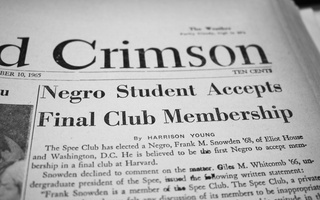From an undisclosed location in Russia, Edward Snowden—a whistleblower considered by different groups to be a martyr, a coward, and a traitor—spoke with Law School professor Lawrence Lessig via Google Hangouts at a packed lecture hall Monday.
A former National Security Agency contractor, Snowden leaked classified government documents about NSA surveillance programs last year, marking one of the largest breaches of federal intelligence in recent history.
Lessig began the interview by asking Snowden about his background and ideologies. During his time with the Central Intelligence Agency and NSA, Snowden said he observed that most people in politics are well-intentioned, but that certain policies, created by specific politicians and often not publicized, do not reflect the public’s views and endanger democratic principles.
“When decisions are made in the dark, the quality of the decisions is reduced,” Snowden said.
Snowden also said that the vast scope of the NSA’s “covert action programs,” of which some members of Congress were not aware at the time of Snowden’s leak, was “changing the boundaries of rights that we have as free people.”
“I was witness to mass violations to our Constitution,” Snowden said. In addition, he stated that the surveillance programs went directly against international doctrines such as the Universal Declaration of Human Rights and the International Covenant on Civil and Political Rights.
When Lessig asked Snowden about his decision to release the classified documents to the press, Snowden said he wished to give access to multiple sources to enable a “marketplace” for the information.
“What I tried to do was ensure that only information that was necessary was exposed to journalists who were acting in the public interest,” Snowden said. “The work of the press is to challenge the government for control of information.”
Lessig then asked Snowden about a scenario in which surveillance data was encrypted such that only authorized individuals could retrieve limited and specific data. Snowden responded by saying that such surveillance nevertheless violates the Fourth Amendment’s prohibition of unwarranted seizure.
“Even if databases are encrypted, temptation for abuse is very strong,” Snowden said. “Policy is a very weak protection.”
According to Snowden, the best way to protect against such abuses is to conduct a broad public conversation and to keep human rights in mind.
“Ultimately, it comes down to natural rights that cannot be voted away,” he said. “When institutions fail, when laws fail, natural laws prevail.”
Lessig then turned the conversation to Snowden’s personal reflections.
Snowden said that he had second thoughts about his actions before releasing the documents, saying that he only sought to serve the public interest, not to do any harm. Still, he said he felt that government accountability to the public was so corrupted that he needed to take a stand, and that he was well aware of the risks and consequences of his actions.
“There is no due process available to whistleblowers in the intelligence agency,” he said.
Snowden’s remarks regarding his motives and the role of whistleblowers in society sparked mixed feedback from the audience.
“I agree with him 100 percent,” said audience member Alyson Hayes after the event. “I respect that he was trying to bring information to us and let us decide what to do with it.”
Dana Gold, a senior fellow with the Government Accountability Project, said after the event that she felt Snowden did an excellent job detailing corruption in the branches of government responsible for overseeing surveillance programs.
“I take issue with his definition of whistleblowers, however,” she said. “[Snowden] says a whistleblower’s motive is to protect the public interest and let the public make decisions, but I think only the first part applies because the laws in place already represent the public’s decision.”
Read more in University News
Activists Kick Off Week-Long Fast for DivestmentRecommended Articles
-
Heart-Attack Gang Drops AnotherA Harvard men's basketball loss these days has about as much grace and subtlety as the death of a great
-
In Talk, Greenwald Blames Government, Media for Distorting Snowden's IntentionsGlenn Greenwald blamed both the government and the media for distorting Snowden’s intentions while debuting his book, “No Place to Hide.”
-
 'Citizenfour' Explores Snowden
'Citizenfour' Explores Snowden -
 Integrating Prep Schools and Punch Season: Frank M. Snowden ’68
Integrating Prep Schools and Punch Season: Frank M. Snowden ’68 -
'Snowden' Cool and Compelling“Snowden” is not explicit propaganda for its eponymous protagonist’s heroism or traitorship. Despite some information that arguably can be classified more as fluff than as substance, “Snowden” succeeds in telling a compelling story that risks being repetitive.













